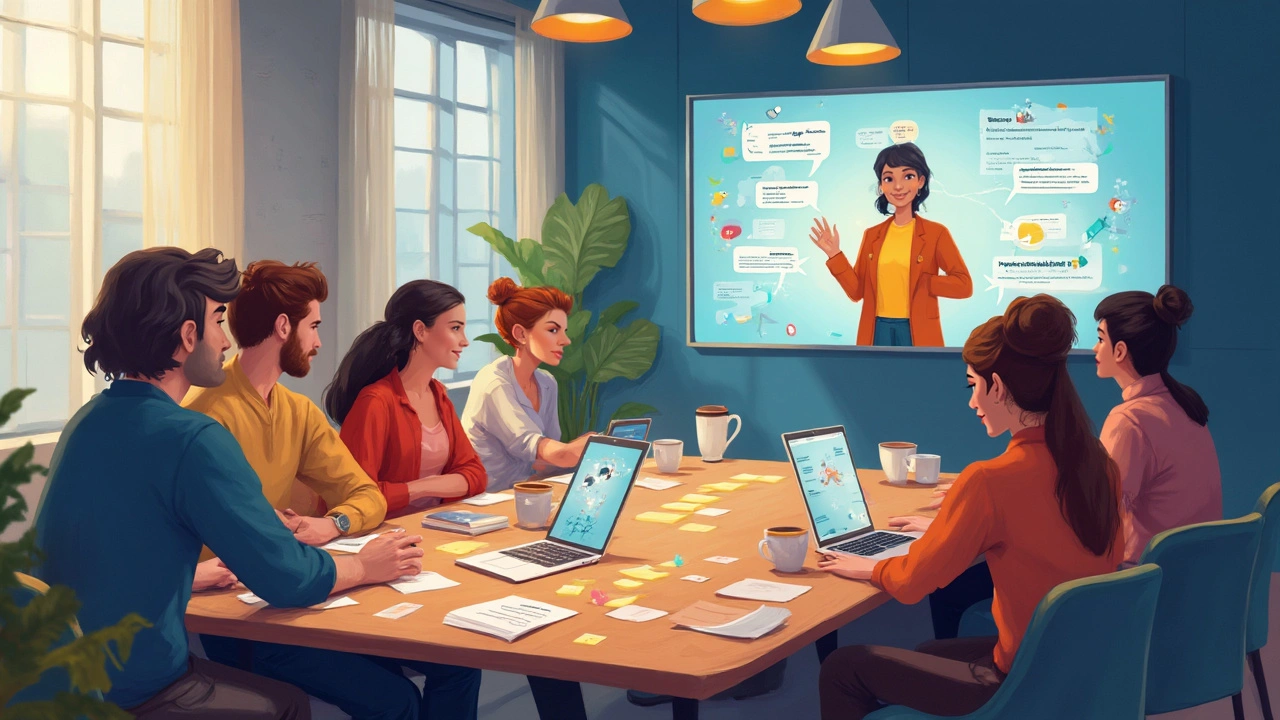You don’t need mind-blowing budgets or an entire floor of SEO gurus to boost your site—just the right AI assistant. ChatGPT is rewriting the rulebook for search visibility, helping businesses in ways that seemed out of reach a year ago. Earlier, getting on Google’s radar meant endless hours of research and guesswork. Now, you can turn ideas into high-ranking articles, spot new keyword gaps, and optimize pages at lightning speed. Here’s the kicker: AI’s not just a shiny toy; it’s a game-changer for anyone who wants to get seen online. The digital race in 2025 goes to the fastest—so, are you keeping up?
How ChatGPT Understands the SEO Landscape
Staying visible online feels like chasing a moving target. Google keeps updating its algorithms, search intent shifts by the week, and there’s always a new tool promising the world. But ChatGPT is different because it doesn’t just regurgitate data. It’s trained on a jaw-dropping range of articles, forums, publications, and websites—basically, the same places people are hanging out and searching from. This means it “gets” the language people actually use when typing queries into Google or Bing. Using natural language processing, it can spot the connection between people’s questions and the terms that deliver answers.
If you’ve ever hit a dead end with keyword research, you’ll understand why this matters. ChatGPT doesn’t get distracted by random noise or narrow search volumes from 2022. It can draw on the latest trends, zero in on emerging topics, and help you craft content that’s not only SEO-friendly but also genuinely helpful. For example, searchers today might look up “eco-friendly air conditioners Brisbane 2025” instead of just “air conditioning.” ChatGPT sees the shift and points your content toward actual, living trends.
This makes it a smart sidekick for keyword research, sure, but it also gives you ideas for pillar topics, FAQs, and new niche-area deep dives. It’s like having a supercharged idea factory in your browser. Most importantly, it helps you write in a way that sounds human, not like a keyword-stuffed robot—Google’s reward for naturally helpful content.
Already, companies from solo bloggers to big digital agencies across Brisbane use ChatGPT to create content briefs, find overlooked keyword opportunities, and analyze competitors with jaw-dropping accuracy. And by the end of 2024, more than 65% of Australian digital marketers surveyed by SEMrush said they included AI-powered tools like ChatGPT in their everyday SEO strategies. If you’re not, you’re literally behind.
AI-Powered Keyword Research: Move Beyond Guesswork
Traditional keyword research eats up hours, sometimes days, for data gathering, validation, and mapping. And half the time, you’re just chasing keywords with huge competition or picking ideas no one actually searches for. ChatGPT flips this process. Type in your niche or topic, and it can spit out clusters of focus keywords, long-tail variants, related questions, and secondary topics—all within seconds. Want an example? Tell it you’re writing about “plant-based recipes for busy parents.” It’ll give you not just obvious keywords but also fresh angles like “quick vegan lunchbox ideas” or “easy-to-freeze dinner swaps for families.”
This matters because long-tail keywords keep getting bigger in search. According to Ahrefs’ 2025 report, over 68% of all search queries in Australia are four words or more. People type questions, not just keywords. With ChatGPT, you’re catching the nuances—think about targeting “best budget gyms near South Bank Brisbane” rather than “Brisbane gyms.”
Want to go deeper? ChatGPT can analyze existing top-ranking results, then highlight where your competition is dropping the ball. Sometimes, you’ll find they’re missing FAQs or updates that people crave. That’s your ticket for a quick SEO win.
Here’s a trick: ask ChatGPT for semantic keyword maps—webs of related phrases around your main focus. Feed it with up-to-date search data (you can pair it with other tools like SEMrush or Google Trends), and watch as it blends AI insight with live numbers. This combo helps you decide which keywords are hot right now, which are evergreen, and which are worth skipping. Marketers in Brisbane reported slashing research time by up to 80% just by using ChatGPT-driven keyword insights.
And don’t just think of search—voice-activated queries are huge in 2025. ChatGPT predicts natural-sounding phrases people speak, not just what they type. Get ahead by optimizing for both.

Content Creation and Optimization: Making the Algorithm (and Readers) Happy
We’ve all seen those web pages that read as if a machine wrote them for other machines. Not only do readers bounce off fast, but Google’s also catching on. ChatGPT helps you avoid that trap by guiding you through content that reads naturally, but still ticks every SEO box. What’s wild is how easily it can help you break long, technical info into snackable, engaging sections—something Google loves right now, thanks to its push for user-first guidelines.
Let’s say you’re writing a guide on “solar panels in Queensland.” ChatGPT can suggest how to structure your post, what questions to answer, and which examples to use. It’ll even spot missing elements like statistics, case studies, or cost breakdowns that give your page extra credibility. The result: you’re providing more value than competitors stuck plugging the same old stats from three years ago.
If you run a blog, ChatGPT can suggest headline variations designed to catch clicks, meta descriptions that tease without clickbait, and intros that pull readers in. It’ll also recommend internal and external link suggestions to boost authority—which now packs a real punch in Google’s ranking logic. Not sure how to tweak existing posts? Paste your writing in, and it’ll highlight weak spots or suggest keyword swaps to help you rise up the ranks.
Here’s a juicy fact: During the first half of 2025, content updated with ChatGPT-powered SEO optimization at several mid-sized Brisbane ecommerce sites saw average search visibility grow by 22% in two months. It’s not magic—it’s an assistant that never gets tired, and never misses a detail, down to making sure you have schema markup suggestions and image alt text in place. Less time on grunt work means more time testing what works and less time stuck in drafts.
Even for tricky local SEO jobs, ChatGPT shines. Trying to rank a café for “best flat white New Farm”? It’ll tease out local cues, popular dishes, and customer questions to make your Google My Business page or blog articles stand out. With the rise of generative search, specificity and knowledge are the new secrets to ranking higher, and AI hands them over on a plate.
Tips for Seamless ChatGPT Integration and Advanced Tactics
AI is fast, but it’s not a hands-off autopilot. To get the most out of ChatGPT, you’ve got to guide it with clear prompts, check the answers for accuracy, and blend its ideas with your unique voice or industry knowledge. Start with these practical steps to make your workflow smoother:
- Feed in your existing content calendar and ask for gaps—ChatGPT can spot missing keywords, suggest seasonal trends, or highlight untapped audiences based on your past articles.
- Use it as an idea generator—but always double-check with live search tools before running with a new concept. Freshness matters, especially in fast-changing markets like tech or food.
- Ask for outlines, full drafts, or headline suggestions, then add your own spin. Google’s still rewarding personality, plus local flavor, not just polished AI.
- Combine ChatGPT with image creators or video scripts for multimedia content that boosts time-on-site and lowers bounce rates—metrics that matter in 2025’s SEO world.
- Get ChatGPT to mimic top-performing anchor text and internal link practices. Sites that boosted smart interlinking in the last year averaged 19% longer user sessions, according to HubSpot’s 2025 Australian SEO update.
Feeling brave? Go advanced. Connect ChatGPT with Zapier or other workflow tools to automate repetitive SEO tasks: bulk metadata creation, product description writing, or daily competitor scans. The future of SEO is quick, a little experimental, and always backed by data. At the end of the day, your job is to turn AI insight into authentic, helpful content that solves real problems for visitors.
The secret sauce? Keep teaching it your brand’s quirks, voice, and local knowledge. ChatGPT’s smart, but with your guidance, it becomes an expert for your exact audience. Check analytics every week—see what’s ranking after the AI touch, what still lags, and what needs the human spark. Pair all this with regular feedback and smart prompt engineering, and you’ll outplay even the big names with double the resources. The best part: your SEO doesn’t feel like a guessing game anymore.
If you want your website to punch well above its weight in 2025, stop thinking of ChatGPT as just a chatbot. It’s the tool that takes your SEO work from repetitive chores to powerhouse results. Once you’ve tasted what AI-led optimization can do, it’s hard to imagine slogging through spreadsheets and drafts the old way.





